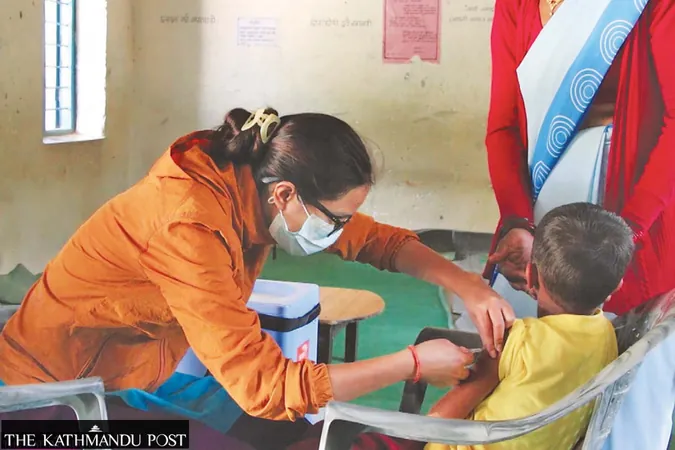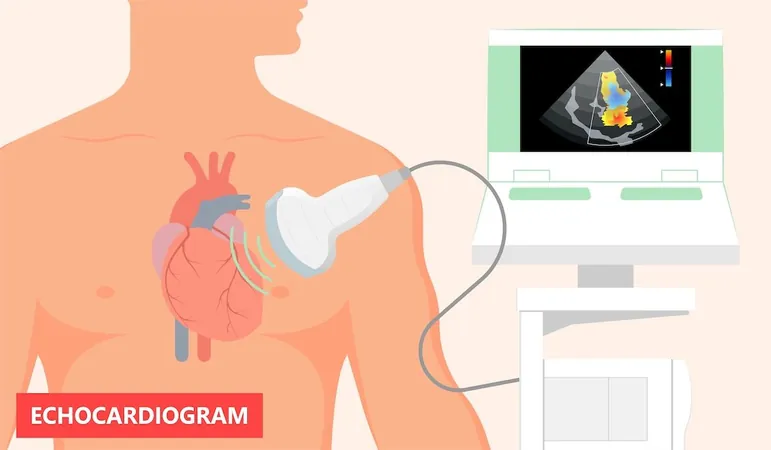
Nepal's Triumph: Rubella Elimination Declared by WHO
2025-08-19
Author: Arjun
Nepal Celebrates Major Public Health Victory
On August 19, 2025, Kathmandu erupted with joy as the World Health Organization (WHO) announced that Nepal has officially eliminated rubella, a highly contagious viral disease. This significant achievement highlights the nation's determination to protect its citizens from vaccine-preventable illnesses.
Why Rubella Matters: The Impact on Pregnant Women
Rubella, commonly known as German measles, poses serious risks, especially to pregnant women. An infection can lead to miscarriage, stillbirth, or lifelong birth defects. Thankfully, this dangerous disease is preventable through safe and cost-effective vaccines.
A Collaborative Effort for Change
Dr. Catharina Boehme, WHO South-East Asia Officer-in-Charge, praised Nepal’s accomplishment, stating, "This success is a testament to the relentless commitment of the country's leadership and dedicated healthcare workers, along with the proactive support from engaged communities. It's a bright start for babies and a hopeful future free of rubella disease."
Certification Process and Regional Context
The Regional Verification Commission for Measles and Rubella elimination (SEA-RVC) recommended Nepal’s verification during its annual meeting held from July 22-24, 2025. After reviewing meticulous data from the national verification committee on disease surveillance and immunization coverage, the commission confirmed Nepal’s elimination of rubella.
Joining the Ranks of Regional Leaders
Nepal proudly stands as the sixth country in the WHO South-East Asia region to achieve rubella elimination. Other nations like Bhutan, DPR Korea, Maldives, and Timor-Leste have also successfully eradicated either measles or rubella in their pursuit of better public health by 2026.
Words of Congratulations and Commitment
Dr. Rajesh Sambhajirao Pandav, WHO Representative to Nepal, extended his congratulations to the nation, stating, "This outstanding public health achievement is the result of robust collaboration between the government, dedicated health workers, partners, and communities. WHO is committed to supporting Nepal in maintaining this success."
The Journey Towards Elimination
Nepal introduced the rubella-containing vaccine in its immunization program in 2012, targeting children aged 9 months to 15 years. A second dose was integrated into the routine immunization schedule in 2016. Despite challenges from public health emergencies like the COVID-19 pandemic and devastating earthquakes, four national vaccination campaigns in 2012, 2016, 2020, and 2024 successfully raised vaccine coverage.
Innovative Strategies Propel Success
To ensure that every child was vaccinated, Nepal implemented innovative strategies such as ‘immunization month,’ outreach programs to cover missed children, and motivating districts to attain ‘fully immunized’ status. These efforts culminated in over 95% vaccination coverage for at least one dose of the rubella vaccine by 2024.
Strengthening Surveillance for the Future
To further bolster public health, Nepal recently introduced a sophisticated laboratory testing algorithm, the first of its kind in the WHO South-East Asia region, reinforcing the country's surveillance capabilities and commitment to a rubella-free future.


 Brasil (PT)
Brasil (PT)
 Canada (EN)
Canada (EN)
 Chile (ES)
Chile (ES)
 Česko (CS)
Česko (CS)
 대한민국 (KO)
대한민국 (KO)
 España (ES)
España (ES)
 France (FR)
France (FR)
 Hong Kong (EN)
Hong Kong (EN)
 Italia (IT)
Italia (IT)
 日本 (JA)
日本 (JA)
 Magyarország (HU)
Magyarország (HU)
 Norge (NO)
Norge (NO)
 Polska (PL)
Polska (PL)
 Schweiz (DE)
Schweiz (DE)
 Singapore (EN)
Singapore (EN)
 Sverige (SV)
Sverige (SV)
 Suomi (FI)
Suomi (FI)
 Türkiye (TR)
Türkiye (TR)
 الإمارات العربية المتحدة (AR)
الإمارات العربية المتحدة (AR)